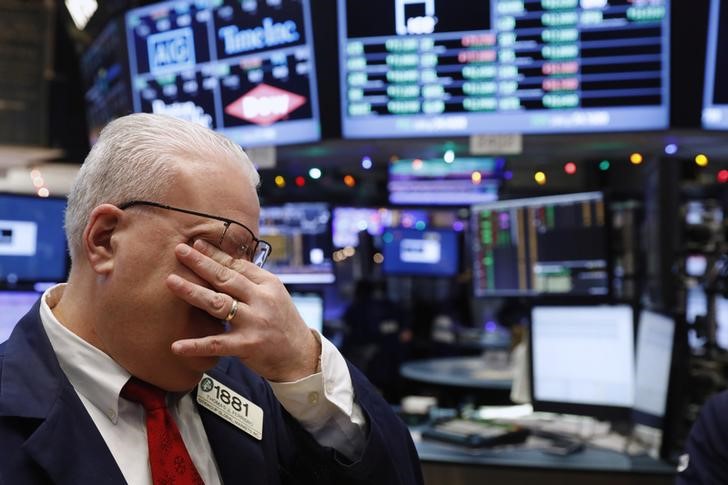Investing.com - U.S. futures slumped on Monday as China retaliated against the U.S. by suspending imports of American agricultural goods and letting the yuan depreciate.
The yuan slipped below 7 per U.S. dollar for the first time since 2008 at one stage. Even though the People’s Bank of China set the daily midpoint of the currency's trading band at 6.9225 per dollar, the onshore yuan market is so tightly controlled as to give the day's trading range a quasi-official seal of approval.
The moves come only days after U.S. President Donald Trump proposed another 10% tariffs on the remainder of all U.S. imports of Chinese goods, worth about $300 billion. Trump has often accused China of weakening its currency to make exports cheaper and getting an unfair advantage in trade, which Beijing denies.
Nasdaq 100 futures fell 132 points or 1.7% by 6:41 AM ET (10:41 GMT), while Dow futures lost 324 points or 1.2% and S&P 500 futures were down 38 points or 1.3%.
The escalation of the trade war may overshadow the U.S. earnings season, which continues Monday with Tyson Foods (NYSE:TSN), Loews (NYSE:L) and others.
Technology stocks were down in premarket trade, with Facebook (NASDAQ:FB) slumping 2.3%, Tesla (NASDAQ:TSLA) down 2.3% and Microsoft (NASDAQ:MSFT) falling 1.9%. Apple (NASDAQ:AAPL) slipped 2.3%, while Cisco (NASDAQ:CSCO) declined 1.2% and Intel (NASDAQ:INTC) lost 1.4%.
JP Morgan Chase (NYSE:JPM) was down 1.8%, while Caterpillar (NYSE:CAT) fell 1.4% and Ford Motor Company (NYSE:F) lost 1.5%.
China-focused HSBC Holdings (LON:HSBA) (NYSE:HSBC) fell 1.9% after its board ousted CEO John Flint, a 30-year veteran at the bank, less than a year-and-a-half after he took over in the top position.
On the economic front, the IHS Markit composite PMI is released at 9:45 AM ET (13:45 GMT), while the ISM non-manufacturing PMI comes out at 10:00 AM ET (14:00 GMT).
In commodities, crude oil fell 0.8% to $55.20 a barrel. Gold futures gained 0.8% to $1,468.75 a troy ounce. It had earlier hit a six-year high of $1,473.05. The U.S. dollar index, which measures the greenback against a basket of six major currencies, dipped 0.3% to 97.572, as the dollar fell against funding currencies such as the yen and Swiss franc, but rose against higher-yielders.
